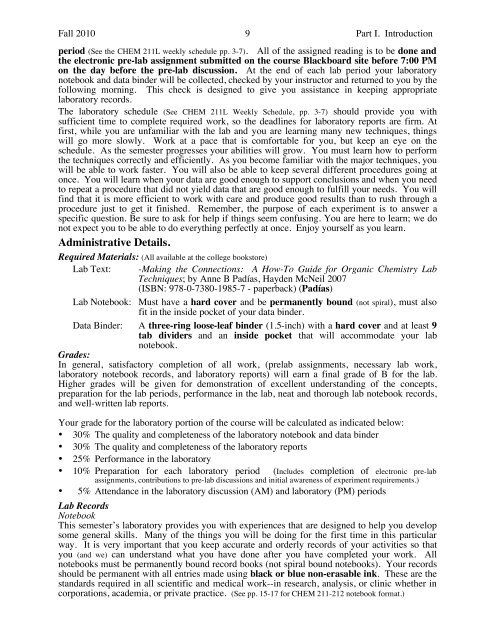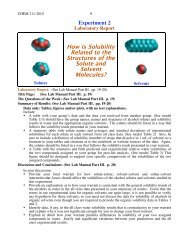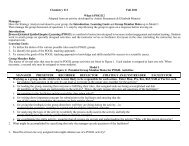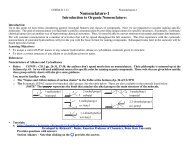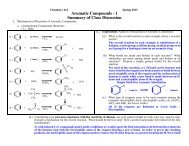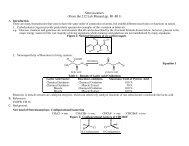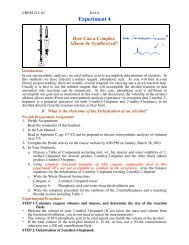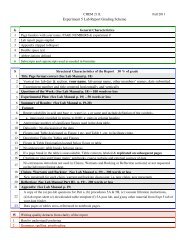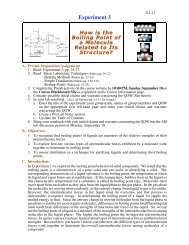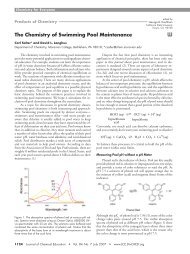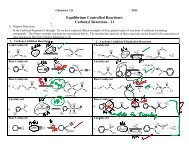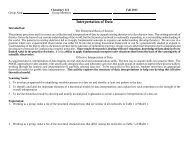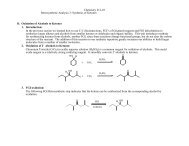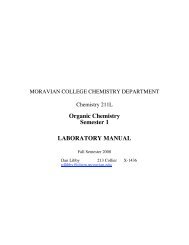Organic Chemistry Semester 1 LABORATORY MANUAL - Moravian ...
Organic Chemistry Semester 1 LABORATORY MANUAL - Moravian ...
Organic Chemistry Semester 1 LABORATORY MANUAL - Moravian ...
You also want an ePaper? Increase the reach of your titles
YUMPU automatically turns print PDFs into web optimized ePapers that Google loves.
Fall 2010 9 Part I. Introduction<br />
period (See the CHEM 211L weekly schedule pp. 3-7). All of the assigned reading is to be done and<br />
the electronic pre-lab assignment submitted on the course Blackboard site before 7:00 PM<br />
on the day before the pre-lab discussion. At the end of each lab period your laboratory<br />
notebook and data binder will be collected, checked by your instructor and returned to you by the<br />
following morning. This check is designed to give you assistance in keeping appropriate<br />
laboratory records.<br />
The laboratory schedule (See CHEM 211L Weekly Schedule, pp. 3-7) should provide you with<br />
sufficient time to complete required work, so the deadlines for laboratory reports are firm. At<br />
first, while you are unfamiliar with the lab and you are learning many new techniques, things<br />
will go more slowly. Work at a pace that is comfortable for you, but keep an eye on the<br />
schedule. As the semester progresses your abilities will grow. You must learn how to perform<br />
the techniques correctly and efficiently. As you become familiar with the major techniques, you<br />
will be able to work faster. You will also be able to keep several different procedures going at<br />
once. You will learn when your data are good enough to support conclusions and when you need<br />
to repeat a procedure that did not yield data that are good enough to fulfill your needs. You will<br />
find that it is more efficient to work with care and produce good results than to rush through a<br />
procedure just to get it finished. Remember, the purpose of each experiment is to answer a<br />
specific question. Be sure to ask for help if things seem confusing. You are here to learn; we do<br />
not expect you to be able to do everything perfectly at once. Enjoy yourself as you learn.<br />
Administrative Details.<br />
Required Materials: (All available at the college bookstore)<br />
Lab Text: -Making the Connections: A How-To Guide for <strong>Organic</strong> <strong>Chemistry</strong> Lab<br />
Techniques; by Anne B Padías, Hayden McNeil 2007<br />
(ISBN: 978-0-7380-1985-7 - paperback) (Padías)<br />
Lab Notebook: Must have a hard cover and be permanently bound (not spiral), must also<br />
fit in the inside pocket of your data binder.<br />
Data Binder: A three-ring loose-leaf binder (1.5-inch) with a hard cover and at least 9<br />
tab dividers and an inside pocket that will accommodate your lab<br />
notebook.<br />
Grades:<br />
In general, satisfactory completion of all work, (prelab assignments, necessary lab work,<br />
laboratory notebook records, and laboratory reports) will earn a final grade of B for the lab.<br />
Higher grades will be given for demonstration of excellent understanding of the concepts,<br />
preparation for the lab periods, performance in the lab, neat and thorough lab notebook records,<br />
and well-written lab reports.<br />
Your grade for the laboratory portion of the course will be calculated as indicated below:<br />
• 30% The quality and completeness of the laboratory notebook and data binder<br />
• 30% The quality and completeness of the laboratory reports<br />
• 25% Performance in the laboratory<br />
• 10% Preparation for each laboratory period (Includes completion of electronic pre-lab<br />
assignments, contributions to pre-lab discussions and initial awareness of experiment requirements.)<br />
• 5% Attendance in the laboratory discussion (AM) and laboratory (PM) periods<br />
Lab Records<br />
Notebook<br />
This semester’s laboratory provides you with experiences that are designed to help you develop<br />
some general skills. Many of the things you will be doing for the first time in this particular<br />
way. It is very important that you keep accurate and orderly records of your activities so that<br />
you (and we) can understand what you have done after you have completed your work. All<br />
notebooks must be permanently bound record books (not spiral bound notebooks). Your records<br />
should be permanent with all entries made using black or blue non-erasable ink. These are the<br />
standards required in all scientific and medical work--in research, analysis, or clinic whether in<br />
corporations, academia, or private practice. (See pp. 15-17 for CHEM 211-212 notebook format.)


